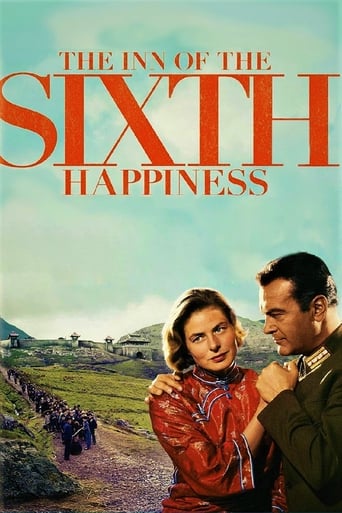jerrylb
Despite its length, the mish-mash of accents and the alarming number of handkerchiefs needed to watch this film, 'The Inn of the Sixth Happiness' overflows with love of life and humanity. Bergman is luminous in her role, and the intense emotion she pours into every scene lifts this otherwise average film onto a higher plane.Robert Donat was terminally ill with a brain tumour when he made this film, and (much to his professional embarrassment) had to have his lines on cue-cards dotted around the set for his last few shots. Ingrid Bergman's tears are desperately real, for Donat's final words are the farewell of a dying man where art and life fold together into a brief unity. One of the most poignant moments in cinema.
Claudio Carvalho
In the 30's, the working-class Englishwoman Gladys Aylward (Ingrid Bergman) leaves Liverpool and arrives in London, trying to join the China Missionary Society expecting to be sent to China. However, having only ordinary schooling, her request is turned down due to her lack of qualification to the position. Gladys works hard as a maid and uses all her savings and salaries to buy a train ticket to Tientsin. Then she travels by mule to the remote province of Wangcheng, where she works with the Englishwoman Jeannie Lawson (Athene Seyler) and the Chinese cook Yang (Peter Chong) in the Inn of the Sixth Happiness. When Ms. Lawson has an accident and dies, Gladys has no money to run the establishment and accepts the position of "foot inspector" offered by the Mandarin Hsien Chang (Robert Donat). She is assigned to visit the countryside to promote and enforce the government's law against foot binding Chinese girls. She is successful, changes her nationality to Chinese and her name to Jen-ai (meaning "the one who loves people"), surprising the skeptical bi-racial Captain Lin Nan (Curt Jurgens). When Wangcheng is invaded by the Japanese, Jen-ai travels through the mountains with one hundred children to save them from death."The Inn of the Sixth Happiness" is a wonderful and engaging epic based on the true story of the enlightened Gladys Aylward. Her biography romanticized by Hollywood is awesome, and the movie is fantastic. Ingrid Bergman is stunning in the role of a servant in a period of class struggle in London determined to go to China where she believes she belongs and has a mission from God to be accomplished. The colors and the landscapes are impressive, but the cast of Ingrid Bergman as a woman not gorgeous; Curt Jurgens as a Chinese-Caucasian; and Robert Donat as a Chinese is weird, but they have perfect performances and I believe that is what matters in a film. My vote is nine.Title (Brazil): "A Morada da Sexta Felicidade" ("The Inn of the Sixth Happiness")
bkoganbing
This film concerns the life and achievements of one Gladys Aylward, a Christian woman from Great Britain who conceived early on that her place in the world was in China. She was a remarkable person who let absolutely nothing deter her in her calling. That included a lack of formal education, no support at all from any accredited missionary group and no money of her own. She worked as a maid to get the money to get a one way ticket to China with only an address of an aged female missionary who needed a young assistant.This film marked Ingrid Bergman's complete return to our fickle public's favor. After the scandal of her affair with Roberto Rosellini and her divorce, the public would not accept her in saintly roles like Joan of Arc and The Bells of St. Mary's. But winning her second Oscar two years earlier cemented her comeback from Europe and this part restored her in our fickle public's affections. We'd never get away with casting her as an Englishwoman today, but she overcomes any accent problems with unbridled talent.She soon inherits the whole mission when Athene Sayler dies. And she supports it by working as a foot inspector for the local mandarin. In those days of the twenties among other things the Kuomintang government was trying to do was undo the Chinese custom of footbinding females at a young age so they would have petite feet. It met with a lot of local resistance, but she proves up to the task.The title of the film comes from the idea that Athene Sayler had. Not to open up a formal church as such. Instead she wanted to open an inn in which travelers could stop and hear stories for entertainment. No television in those rooms. The stories they heard were those of the Bible. It was Sayler, Bergman, and their cook Peter Chong who ran the place and soon it was Bergman and Chong.If Bergman's casting seems bizarre by today's standards, the casting of Curt Jurgens as a Chinese Kuomintang Army Colonel is worse. Jurgens's occidental features are written into the script making him bi-racial, Dutch father and Chinese mother. He's a man with little convictions about spiritual matters, except he comes to believe in Bergman, in her innate decency, her dedication to his people, and what she's trying to accomplish. The mandarin is even more bizarrely cast. The part calls for an asthetic actor so they got the best around in Robert Donat. This was Mr. Donat's farewell performance, he died while the film was still in theaters. No one would get away with that casting today, but Robert Donat is also that good a player.I'm sure if the film were remade today, we'd have real oriental players like Russell Wong for the Colonel and James Shigeta for the mandarin and maybe someone like Kate Winslet for Gladys Aylward. But would it be as good as this film?The subject of missionaries and the good they do is one hotly debated topic. It does take a certain amount of brass to go to a given place and tell everyone your belief system is all wrong. I suppose the best way to lead is by example and Ingrid Bergman as Gladys Aylward set the best example she could. In fact she did one thing most missionaries, good or bad, wouldn't consider. She gave up her British citizenship and became a Chinese citizen.The film was helped a great deal by the inclusion of that children's song This Old Man where Ingrid tries to teach her youngest charges some English with it. It was enormously popular back in the day and Mitch Miller's record of it was heard constantly.The climax of the film and what gave Gladys Aylward her place in history is that trek with a hundred orphans away from the advancing Japanese army. A remarkable achievement indeed from a remarkable dedicated woman who wouldn't listen to anything, but what was inside her soul.
skylinegtr2500
I saw the trailer for this on PBS and at first I thought I be in for a cringe-fest a la Charlie Chan. I've become a fan of many "for us by us" Hong Kong and Asian movies with real actors and actresses, so from these movies, my expectations are a little more refined than those who might see Hero as "that Japanese or Chinese movie." Instead of cringing, I found a thoroughly enjoyable movie with its heart in the right place. Someone commented that Ingrid Bergman was for real this one, and I got that impression as well.I believe the foot-binding practice had been officially banned by the Manchus but the ban had never been really enforced, especially in the more remote areas. The foot-binding scene was really nice. It did not imply "I am western-person, I will save you Chinese from this stupid practice." Very simple, nicely done.





